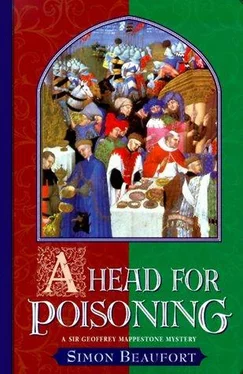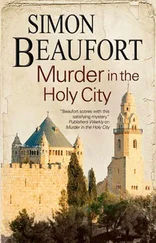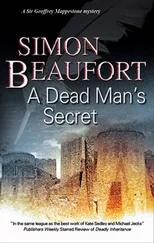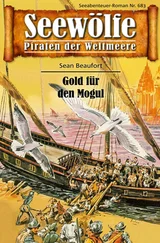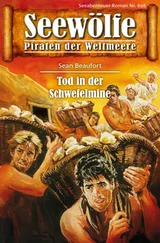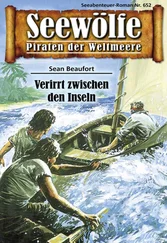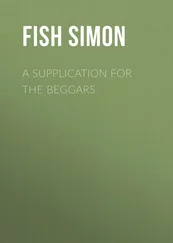Simon Beaufort - A Head for Poisoning
Здесь есть возможность читать онлайн «Simon Beaufort - A Head for Poisoning» весь текст электронной книги совершенно бесплатно (целиком полную версию без сокращений). В некоторых случаях можно слушать аудио, скачать через торрент в формате fb2 и присутствует краткое содержание. Год выпуска: 2015, Издательство: Severn House Publishers, Жанр: Исторический детектив, на английском языке. Описание произведения, (предисловие) а так же отзывы посетителей доступны на портале библиотеки ЛибКат.
- Название:A Head for Poisoning
- Автор:
- Издательство:Severn House Publishers
- Жанр:
- Год:2015
- ISBN:нет данных
- Рейтинг книги:4 / 5. Голосов: 1
-
Избранное:Добавить в избранное
- Отзывы:
-
Ваша оценка:
- 80
- 1
- 2
- 3
- 4
- 5
A Head for Poisoning: краткое содержание, описание и аннотация
Предлагаем к чтению аннотацию, описание, краткое содержание или предисловие (зависит от того, что написал сам автор книги «A Head for Poisoning»). Если вы не нашли необходимую информацию о книге — напишите в комментариях, мы постараемся отыскать её.
A Head for Poisoning — читать онлайн бесплатно полную книгу (весь текст) целиком
Ниже представлен текст книги, разбитый по страницам. Система сохранения места последней прочитанной страницы, позволяет с удобством читать онлайн бесплатно книгу «A Head for Poisoning», без необходимости каждый раз заново искать на чём Вы остановились. Поставьте закладку, и сможете в любой момент перейти на страницу, на которой закончили чтение.
Интервал:
Закладка:
“Where did you get that?” asked Helbye in amazement. “We went nowhere near a market today.”
“I hope you did not steal it from the King,” said Geoffrey, fixing Ingram with his steady gaze, and remembering the trestle tables piled high with food in the hall at Chepstow.
Ingram shifted uncomfortably. “One of the serving wenches gave it to me last night. She took a fancy to a gallant young Crusader.”
He grinned conspiratorially, but Geoffrey did not smile back. Ingram was playing a dangerous game, he thought-he was insolent to the knight he served, and he stole from the King. When Ingram offered him a piece of the cheese, he declined it, although no one else had any such scruples.
Later, as his men slept, Geoffrey dozed lightly, leaning against the wall with his sword resting across his knees. Caerdig began to move nearer to him, rustling through the straw. The dog opened a malevolent eye at the disturbance, growled, and closed it again. Geoffrey’s fingers tightened their grip on the sword.
“I do not understand you,” Caerdig said, when he had settled himself close enough to Geoffrey to avoid waking the others as he spoke. “You could have told the King that my people killed Sir Aumary, and then Lann Martin might have been yours.”
“How many more times do I need to tell you?” said Geoffrey softly. “I do not want it. If I had wished to be a landlord, I could have had something ten times the size of Lann Martin in the Holy Land.”
“But your brothers would have been pleased to have it for themselves,” pressed Caerdig. “What will they say when they hear that you missed such a valuable opportunity to acquire it for them?”
“They can say what they like.” Geoffrey grinned at Caerdig in the darkness. “I will tell them that they should be grateful I did not tell the King what you suspected-that the arrow which killed Aumary was actually intended for me.”
“That is no laughing matter,” said Caerdig severely. “You will not last long among the Mappestones if you underestimate them. My uncle Ynys underestimated them, and look what happened to him.”
“What did happen to him?” asked Geoffrey. “You say he was killed by my brother Henry?”
Caerdig was silent for a moment, and Geoffrey could hear him fiddling with the buckle on his belt.
“There was a silly argument over our sheep-Henry claimed that they had broken a fence and grazed his pastureland. You know how Henry can be-he came spitting fire and demanding instant reparation. Bitter words were exchanged, and Henry threatened to kill Ynys. The next day, Ynys’s body was found. He had been killed by a hacking blow from a sword-as if someone had tried to sever his head from his body.”
Geoffrey suddenly recollected Caerdig’s reaction to Ingram’s jest-about hacking a bird’s head from its shoulders-when Geoffrey had been quick to draw his sword earlier that day. Was that the reason for his curious response? Ingram had a spiteful tongue, and might have learned about the fate of Caerdig’s uncle in the taverns the previous night. Geoffrey would not put a deliberately provoking remark about such a matter past the malicious man-at-arms.
Caerdig continued, suppressed rage making his voice unsteady. “Of course, there were no witnesses to the crime, and Henry denies having anything to do with it. But not many men are allowed to own swords in the woods-you know that swords are forbidden by the Forest laws-although Henry has permission to carry one. Henry has the Norman love of fighting and killing, even though he is no knight.”
Geoffrey drummed his fingers on the conical helmet that lay at his side. “Was there no enquiry into the murder? Was the Earl of Hereford informed? He is overlord here, is he not?”
“Hereford!” spat Caerdig in disgust. “He has no power in these parts. It is the Earl of Shrewsbury who is the dominant force in the border lands now.”
“Shrewsbury, then,” Geoffrey said impatiently. “Did Shrewsbury look into Ynys’s death?”
“He did, but he lost interest when he heard Ynys had named an heir-me-and that the lands were not lying vacant. All Shrewsbury did was to warn Henry not to do it again.”
“Well, Henry is unlikely to kill Ynys a second time,” said Geoffrey wryly. “But it seems to me that the Earl of Shrewsbury is causing a number of problems in the border regions.”
“I should say,” agreed Caerdig fervently. “He has been busy bribing the Welsh princes to back him against King Henry of England, should the need ever arise. But the Earl is not a man to act unless there is some benefit to be had for himself, and there was nothing to gain from Henry’s arrest for Ynys murder. It might even have had a negative effect, since the King, for some unaccountable reason, likes your brother Henry.”
“What is said in these parts about the death of King William Rufus?” asked Geoffrey curiously. “It was rumoured in the Holy Land that King Henry had much to gain from his brother’s sudden and most convenient demise.”
“So he did,” said Caerdig, startled by the sudden turn in conversation. He glanced around nervously. “But this is not a topic for wise men to be discussing in a barn with thin walls.”
“Wise men do not ambush knights,” Geoffrey pointed out. “But what of Shrewsbury? Is there talk that he might have had something to do with the regicide?”
“No,” said Caerdig, surprised. “Nothing was ever said against Shrewsbury. Why would Rufus’s death be advantageous to the Earl when Rufus liked him so? But King Henry had much to gain from Rufus’s death-if you suspect foul play, do not look to Shrewsbury, look to King Henry.”
Geoffrey was silent, thinking. Few people openly questioned whether Rufus’s death was anything other than a terrible accident at the hands of the unlucky Tirel, although there were rumours and suspicions galore. But Tirel was protesting his innocence in France, and King Henry believed that the Earl of Shrewsbury had played a role in the death, while others believed Henry might know more of the matter than he was revealing. Who was lying and who was telling the truth? Geoffrey rubbed his eyes tiredly, and decided that he did not want to know anyway.
He wondered what were the chances of escape, if he defied the King, and rode for Portsmouth without stopping at Goodrich to see his ailing father. Godric had never had much affection for his youngest son-rare were the days when he had even recalled Geoffrey’s correct name. Geoffrey had not seen his family for twenty years, and the only one who had made the slightest effort to maintain contact had been Enide. And she was dead, perhaps poisoned by the very brother or sister who may have tried to shoot Geoffrey in the forest.
He rubbed the bridge of his nose, and sighed softly. He knew it was not wise to disobey orders from a King; even if Geoffrey did manage to reach the Holy Land without being caught by the King’s agents, his defiance was surely likely to catch up with him some time in the future.
Geoffrey realised with a sense of impending doom that he had little choice but to go to Goodrich, and at least be seen to be following the King’s orders. A few days, or a week, should be sufficient to convince the King that Geoffrey believed that Goodrich would remain in Mappestone hands, and then he would be free to leave England-forever.
“It is late,” he said, feeling that the Welshman was watching him in the darkness. “Go to sleep.”
“You should sleep, too,” said Caerdig, settling down in the straw. “And do not worry about me bothering myself to slit your throat during the night. Your brothers will save me that trouble, if I wait long enough.”
CHAPTER THREE
Dawn the next day was misty and damp. Geoffrey rubbed the sleep from his eyes and ran his fingers through his short, brown hair to remove the pieces of straw that were entangled in it. His customary toilet completed, he went in search of something to eat, and persuaded the forester to part with another of his unappetising loaves and some tiny, sour apples. His dog had done its own scavenging, and was eating something that looked a good deal more appealing than Geoffrey’s meagre breakfast. The knight considered taking it from him, but his hands still bore the scars from the last time he had attempted such a rash act, and anyway, Geoffrey already knew who would be the winner in such a contest.
Читать дальшеИнтервал:
Закладка:
Похожие книги на «A Head for Poisoning»
Представляем Вашему вниманию похожие книги на «A Head for Poisoning» списком для выбора. Мы отобрали схожую по названию и смыслу литературу в надежде предоставить читателям больше вариантов отыскать новые, интересные, ещё непрочитанные произведения.
Обсуждение, отзывы о книге «A Head for Poisoning» и просто собственные мнения читателей. Оставьте ваши комментарии, напишите, что Вы думаете о произведении, его смысле или главных героях. Укажите что конкретно понравилось, а что нет, и почему Вы так считаете.
